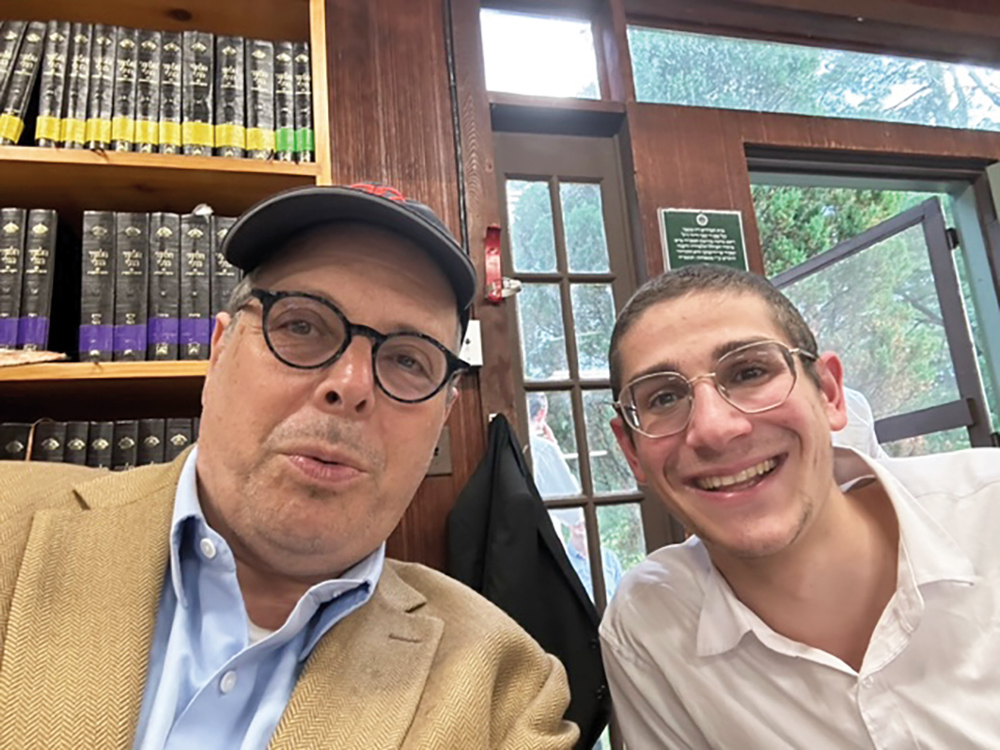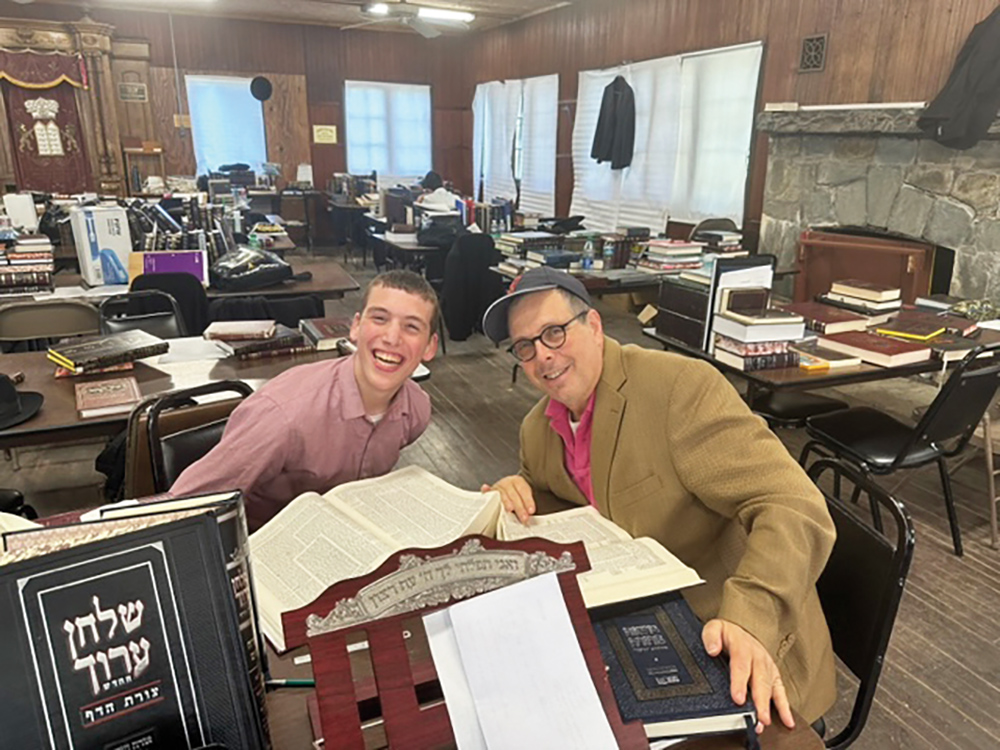By Meyer Muschel
Thirty-eight years ago, my twin brother Joseph, a”h and I had just graduated from Yeshiva College and were about to embark on our different post-graduate paths. As a last hurrah, we decided to spend a summer together at the Morasha Kollel, hosted on the grounds of Camp Morasha in Lake Como, Pennsylvania. The program, relatively new at the time, was known for hosting high school and post-high school students who wanted to spend the summer learning in a relaxed environment in the mountains under the leadership of Rabbi Mordechai Willig, shlita, for the older boys and Rav Yitzchak Cohen, shlita, for the high schoolers.

Both my brother and I would later describe that summer as the best of our lives. To be sure, the facilities at the kollel were nothing to write home about. The bunks were basic and the beit midrash was cooled only with ceiling fans. There was no pool, no gym, no real lake access—nothing but a volleyball court, a baseball field, a basketball court and a tennis court. The afternoons consisted mostly of pickup games that included a bunch of very young Willig boys (sons of Rabbi Willig), then between the ages of 7-12 (all now great mechanchim in their own right) joining us much older guys on the various sports fields, adding a special flavor to the afternoons.
Despite the simplicity of the experience, or perhaps because of it, there was an indescribable—even magical—beauty in the air embodied by what consistently felt like the perfect blend of spiritual and fun. That the dynamic shiurim given by Rabbi Willig were well prepared on relevant topics and were peppered with the rabbi’s dry sense of humor added still another layer of pleasantness to the experience.

That summer was also famous outside the kollel for a 19-inning baseball game played between the New York Mets and the Atlanta Braves on July 4th that didn’t end until 4 a.m, on July 5th. To this day, that game is famous as the second-longest game in baseball history (in terms of time) and for the fireworks show that ran after the game at 5 a.m. on July 5th instead of on the originally scheduled night of the 4th. But in the Morasha Kollel, the game was legendary for another reason. My brother, a”h, a die-hard Mets fan, wanting to hear the game on his small transistor radio, held it against the metal backstop of the baseball field outside of the bunk to improve the radio reception. Little did he realize that he would be standing there for seven hours—from 9 p.m. until 4 a.m. the following morning when the game would finally end, after which he would excitedly wake up the entire bunk to report that the Mets won.
And so, with all of the magic of the summer of 1985 on my mind, I decided, with my wife’s blessing, to return for a few days to the kollel to try and bring back some of the magic of decades ago. I wasn’t disappointed.
Rabbi Willig, my college and kollel rebbe of yesteryear, graciously welcomed me back to camp and personally went out of his way to arrange sleeping accommodations for me, insisting that I stay on campus to have the “full Morasha Kollel experience.”
Incredibly, I found the place almost exactly as I had left it. The bunks were essentially the same—there were still only spinning ceiling fans in the very same but now much older beit midrash—it was old even back in the day—and the facilities were not otherwise significantly improved.

To be sure there were some small changes. The high schoolers now had a beautiful new beit midrash, there were new faculty members, and there was now some structured fun in the form of a trip somewhere at least once a week—in the words of Rabbi Willig on “No-Torah Tuesday”—which, by the way, still had plenty of Torah. The biggest difference, frankly, was me. I was now Barney the Dinosaur—38 years older than the oldest kollel guy at camp—standing out in my purple polo and/or button-down shirt in what was otherwise mostly a sea of “black and white” shirts and pants.
Rabbi Willig, the head of the post-high school program, showed himself to, thank God, be the same dynamic personality he was back in the day with his teaching style and sense of humor completely intact. Rabbi Cohen, too, is still ever-present as the leader of the high school kollel.
I took the opportunity during my visit to sit in on as many shiurim as I could irrespective of the age group to which the shiur was directed. Every single one was top-quality and, though geared to a younger generation, each was spiritually fulfilling for this decades-older student. It was apparent that each of these teachers/rebbes spent a significant amount of time preparing their classes and were coming to the kollel with a great sense of passion and energy.
Apart from sitting in on classes and learning with some of the boys b’chevruta, I found myself at times simply sitting and taking in my surroundings, marveling at the buzz in the beit midrash and absorbing the infectious energy of those around me.
Frankly, the sociological experience was as enjoyable as the learning. I just couldn’t get over the fact that in a world so full of anger, hate and dysfunction, I was sitting in an environment of approximately 130 incredibly well-mannered, positive, polite and engaged young men who were finding tremendous fulfillment from the basics in life and from simply studying Torah in a wooden, no-frills beit midrash. At the same time, sitting there and experiencing what they were experiencing, I completely “got” it.
I also couldn’t get over how they treated me—Barney the Dinosaur. One after another, they came over to say hello and to introduce themselves. One offered to learn with me; another insisted on delivering my food to my table in the dining hall to spare me standing in the food line. Still another offered to get me a siddur, another, an extra copy of a sefer from the shelf. Some just wanted to talk about who I was and explore my story. It was so impressive that these kids were genuinely interested in interacting with someone from the older generation, not exactly something that is common today.
I was also struck by the different locations from where these young men hailed: from France to Israel, from Houston to Baltimore, from Toronto to Virginia and, of course, many from the New York/New Jersey area. Through all the variations, there was the consistency of their experience at the kollel, which was completely in line with my own. I made it a point to speak to many of the boys. In every single case, each expressed that his summer at the kollel was by far the most fulfilling and meaningful summer experience of his life. The Frenchman described his return to his “Gan Eden,” having attended 10 years earlier. The first-generation Israeli spoke of the “most spiritually fulfilling summer ever”, which he indicated followed his father’s own best seven years at the kollel decades earlier. The jock from Manhattan described his experience as “absolutely geshmak.” The theme just kept repeating itself again and again, albeit in different words. Heaven on earth.
It was nothing short of exhilarating to discover that not only was the magic “back” at Camp Morasha’s Kollel but that, in fact, it had never left. And it was particularly heartwarming to see talented educators and Torah leaders doing something so incredibly right against the backdrop of an otherwise challenging and difficult world—and their having a beautiful crop of students to show as the fruits of their labor.
As I concluded my three-day visit, it was difficult to say goodbye. I just didn’t want to leave this oasis. Deep down, though, I realized that my reluctance to leave was rooted in the recognition that I wasn’t just taking a trip down memory lane. I was living our destiny. And oh, what a destiny it is!
Meyer Muschel lives in Bergen County with his wife and two daughters. When he’s not shtayging at the Morasha Kollel, he’s practicing law and involved in real estate transactions and investments.








